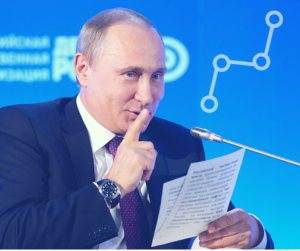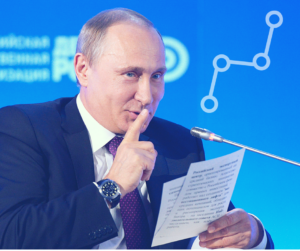Whether or not you believe that Russia's cyber-campaign to mess with this year's U.S. election somehow altered the election's outcome, it should bother every American that there was purposeful, foreign interference in our nation's democratic process.
Unfortunately, there is no such consensus, and the divide between those who care and those who don't is not only deeply partisan, but also a testament to the culture of unabashed political hypocrisy that we now live in.
As many will recall, during the 2012 presidential campaign, President Obama and other prominent Democrats famously mocked Mitt Romney for recognizing Russia as a serious geopolitical threat.
“The 1980s are calling to ask for their foreign policy back,” chided the president in one of his debates against Romney. “The Cold War has been over for 20 years.”
John Kerry took it a step further in that year's Democratic National Convention. With his arms flailing in condescension as he addressed the audience, he called Romney’s assertion that Russia was our number one geopolitical foe “preposterous,” adding that “Mitt Romney talks like he’s only seen Russia by watching Rocky IV.”
Four years earlier, vice presidential candidate Sarah Palin was similarly maligned after she observed Senator Obama’s reaction to the Russian Army invading the nation of Georgia, and called it “one of indecision and moral equivalence.” She went on to say that it was the kind of response “that would only encourage Russia’s Putin to invade Ukraine next.”
Also widely criticized over the years for his strong words on Russia has been Senator John McCain. He's been calling out Vladimir Putin as a villain since long before Barack Obama and Hillary Clinton were concocting "reset" buttons and ways to end missile-defense deals with our allies.
Of course, these prominent GOP leaders were later vindicated. Military invention in Ukraine, the downing of Malaysia Airlines Flight 17, the undermining of our efforts in Syria, and other high-profile conflicts have made our country and our president look downright impotent when it comes to Russia. And Republicans, especially over the last four years, have had an absolute field day in pointing this out.
The conservative media and the Republican party have been relentless in their criticism of the rise of Russia, as a geopolitical force, under Obama. That's why it's beyond remarkable that Russian interference in our national election process — the very heart of our system of representative government — has been met, for the most part, with striking disinterest by the Political Right.
This shouldn't be a partisan issue, but that's exactly what it has become. Many in the conservative media have joined President-elect Donald Trump in completely dismissing this concern as "sour grapes" by the Democrats, who are still having trouble accepting the election results.
While there's little doubt that many liberals are struggling to recognize the legitimacy of Trump's impending presidency, that's not the story (at least not the important one). The real story is that a foreign entity hacked our political institutions, and used the information they gained to muddle with our election.
And now the same conservative pundits, who for years raised holy hell about Russia's interference in American interests, are suddenly okay with it, simply because their guy (who happens to be a big Putin fan) won the election.
The turnabout has been so sharp that between this and their newfound love for WikiLeaks, I'm half expecting some of these individuals to start wearing ushankas on their cable-news and radio shows. The hypocrisy has been astounding.
On yesterday's The Five, Greg Gutfeld (one of the few people in the media who frequently decries political double standards) pointed out that if Hillary Clinton had won the election amidst Russian interference, "It will be all-out war around here [Fox News]." He added, "Trump would be screaming, and of course, the [mainstream] media would dismiss it. That’s the nature of team sport politics, which prevents us from seeing that a foreign power may have subverted our system, and we know that that’s wrong. But maybe we don’t care that it’s wrong because our side won.”
He was absolutely right. And it should be noted that Gutfeld hasn't been the only intellectually consistent voice, in regard to this story. John McCain, Mitch McConnell, and other GOP leaders have articulated the concern as well, and conservative writer Ben Shapiro struck the right note yesterday when he tweeted, "You can be concerned about Russian interference in our election and still think Trump would have won without that interference."
Unfortunately, the instinct of far too many pro-Trumpers (and partisans in general) is to prioritize the image of their tribe above the interests of the nation. Many on the political Left are engaging in similar behavior, in regard to this story.
It was the Democratic party and the liberal media, after all, that had been assuring the American public for years that Russia was an ally, and that our strained relations with the country were attributable only to George W. Bush's "cowboy diplomacy." We were told that Obama had Putin's number, and that Russia was not a genuine threat to the United States.
Now, these same people (who mocked Romney and the rest) have the gall to say that Russia is such an existential threat to the very heart of our nation that they actually changed the outcome of our election? Give me a break. If there was one thing clear about election night, it was that Hillary Clinton didn't need any help from Russia to lose. She was a weak candidate, and her campaign made unforgivable mistakes.
Senate Minority Leader Harry Reid has even charged that the Trump campaign was actually colluding with Russian officials behind the scenes — an serious accusation for which there is absolutely no evidence. Of course, such rhetoric can simply be written off to Reid's long history of lying. Either that, or he had a flashback to four years ago, and confused Trump for Obama, and Putin for Medvedev. Unsurprisingly, Harry had absolutely no problem with that little exchange.
Despite the unprecedented hackery of 2016 (both literally and figuratively), I'm still convinced that this country is capable of viewing certain things through a non-partisan lens. But if we can't even form a consensus that a foreign rival intervening in our elections is a serious problem (that needs a serious answer), I'm not sure how much longer I can continue to believe that.
If Russia's intent was merely to sow distrust in American politics, they could have saved themselves some time and resources by simply studying up on American hyper-partisanship.





